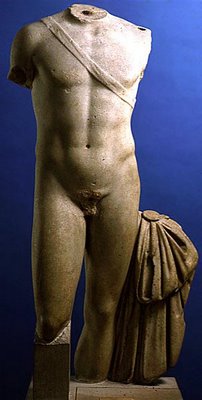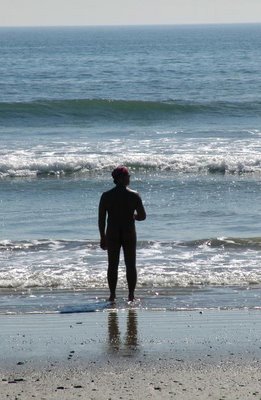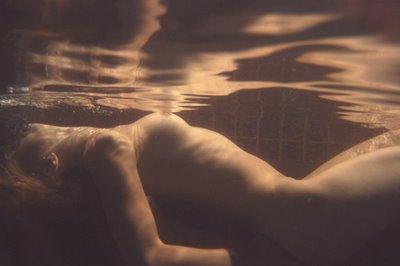The God, The Naiad, and The Gator

Looking is such a marvellous thing, of which we know little; as we look, we are directed wholly outside ourselves --— but, even when we are at our most outward, things seem to happen within us which have been waiting longingly for the moment when they should be unobserved, and while they take their course, intact and strangely anonymous, their significance grows in the object outside, a more convincing, more powerful name, their only possible name, in which we happily and reverently recognize the happenings within us.
-- Rilke, letter to his wife Clara, BR3:215
***
ARCHAIC TORSO OF APOLLO
Ranier Maria Rilke
We cannot know his legendary head
with eyes like ripening fruit. And yet his torso
is still suffused with brilliance from inside,
like a lamp, in which his gaze, now turned to low,
gleams in all its power. Otherwise
the curved breast could not dazzle you so, nor could
a smile run through the placid hips and thighs
to that dark center where procreation flared.
Otherwise this stone would seem defaced
beneath the translucent cascade of the shoulders
and would not glisten like a wild beast's fur:
would not, from all the borders of itself,
burst like a star: for here there is no place
that does not see you. You must change your life.
Transl. Stephen Mitchell

ARCHAIC CREST OF THE GODDESS
today
The invisible of man is the
visible of the gods.
-- Roberto Calasso
Every angel is terrible.
-- Rilke
You have to die for some time
before finding resonance.
The ever-empty surf grows loud
with her lost sursurrance,
most marvelous in the crash
of warm foam edging to my feet
for that faintest trace of her kiss
before receding back to blue
the way she whispered I Love You
and walked forever out the door.
Nothing’s quite divine til the
surface dazzle swills a darker brine,
my aesthetic quilled in the
black quinine of numens too
strange for a name. The broken
sculpture of Apollo which Rilke
observed in a museum in 1906
was a mess; the god had lost his
head along the way, surely crippling
the full intent of shapers who
had gone the way of that head.
And yet that absence unlocked
in the poet’s gaze a sight inside
his seeing, reflecting down the
god’s stone bulk to find dark
brilliance in the chest, depths
drawing his gaze still lower
to still darker loins “where
procreation flared.” Flared!
Not from fullness but its
ruins, beheaded by the fall
of ages and trundled across
the world, installed in some
trumped-up roadshow for later
rubes to gawk at what remains ---
the marble chest, a missing
Grecian penis proud in
vanquished antiquity. And all
I get of him is what pal Rilke
strained from the coursings of
his thoughts a few hours now
a century ago, buttoned with
this chilling shout: “You must
change your life.” Odd
how I heeded those words
here to this burgher’s nice-enough
domicile mid a ruined world.
Home and cat and wife
is all I’ll get of him, the
wolf-god with his arts
firing arrows tipped in language
again and again through
a page as silent as that
surf now decades lost to me.
I am the father now, husband
in the bliss of an ever-
resounding shore where gods
from nipply naiads suck the
hoary ink I pour, quiescent
and so dangerous,
collapsing every line
in her salt blue dazzling roar.
LATE AUTUMN,
PORT ORANGE
1994
There are virilities
you cannot ride
in your sleep.
Your urban morning
has no saddle for
this wild sea, nor
will such winds as these
rein to any corporate task.
No.
Something irresistible
stays here.
Watching storms batter
the tide, itís clear:
Like that raw rock
Rilke saw in Apollo’s
marbled loins,
this sea’s day churns
dark and urgent and cold:
You must derange
your life to save it.
***
"Working after Nature" has in such a high degree made that which is into a task for me, that only very rarely now, as by mistake, does a thing speak to me, granting and giving without demanding that I reproduce it equivalently and significantly in myself. The Spanish landscape ... Toledo - drove this attitude of mine to its extreme: Since there the eternal thing itself -- tower, hill, bridge -- already possessed the incredible, unsurpassable intensity of the inner equivalents through which one might have been able to represent it. External world and vision everywhere coincided as it were in the object; in each a whole inner world was displayed, as though an angel who embraces spaces were blind and gazing into himself. This world, seen no longer with the eyes of men, but in the angel, is perhaps my real task -- at least all my earlier experiments would come together in it; but to begin that task, Ellen, how protected and resolved one would have to be!
-- Ranier Maria Rilke, letter to Ellen Delp, 10/27/1915

1903
2003
A century ago there was
a stillness, a quiet which
belied the truth that the
blade was merely pausing
before plunging again
in its inkhorn of blood.
Cruelties yet imagined
waited for trench and oven
and the lickety-split atom.
In 1903 however it
was fair and wan
with flowers growing in
great abundance over
the stilled killing fields
of China and civil-war
United States. In Paris Rilke
wrote letters for Rodin
and then tried to write
poems with the same
chiselled fury of his master.
New Poems, he called them,
pocket empires of seeing:
"The Panther" and "The
Rose Window" and
"Archaic Torso of Apollo"
Surely there was hope
for this century, if poems
as those could be written.
The future seemed great,
pregnant with an art
which could sanctify
life at last. Rilke at his
high writing-desk laying
pen to paper with Paris
alive in its almost pagan
whirl. But wait -- in
the black psaltery of that ink--
What is that cry far above
(or below) beginning to tear
the page apart? An angel?
Love? Victories? The mouth
of Orpheus ripped from its
stem? This morning it is
early spring in Florida --
a warm wet day to come --
Soon orange blossoms and
yard work and skin bared
at last to the sun -- Battle
to do with terrorists and
bankers and Christian
fundamentalists -- A poem
to write which does not know
its name but hears something
caw from great black wings,
and from that dim future
pluck strange wild strings.

GATOR BAIT’R
2004
As I was sitting in traffic
in the downtown Apopka
bottleneck I noticed
a boat on a trailer next
to me. “Gator Bait’r”
was written in cute gold
glitter script across the aft.
It’s Friday night and I’m
going home, my body
trilling from the last hard
workout of the week (45
minutes of cyclings &
then upper body lifting);
sunglasses, air conditioning,
low jazz, weariness &
endorphins cauling the
ferocity of the rainless
late-afternoon sun, where
its so humid and bright
I cannot even see the sky.
A sign outside a pest
control company a mile
further down says, “10
Days to Bring in the
Biggest Roach in Apopka
and Win Big $?” Why
are these messages
hooking my attention
these blearing dog
days? I drive on listening
to a “Fresh Air” interview
with some guy who’s written
a biography on Fatty
Arbuckle. Traffic darts
helterskelter around me,
everyone desperate to
go home, get to that
first beer, I don’t know.
Seems that Arbuckle went
to a doctor to have a
carbuncle lanced and
the job was botched.
The doctor prescribed
heroin for the pain
and Arbuckle got hooked.
The studio forced him
to quit by building a
cold turkey room in
his house and locking
him into it. He lost so
much weight that when
he went on tour soon
after to promote a movie,
he had to wear a fat suit.
A lime-green Volkwagen
turns onto old 441 ahead
of me bearing a vanity
plate that reads
“NOG8R” -- get it,
No Gator? -- it was
printed on a Florida
Seminoles logo plate.
The rivalry between our
nature and nature’s, the war
of predators and privateers,
is a virile summer rassle
tented in this big heat,
cheered on by whatever
angels are gathered on
the head of this pen --
hawks and turkey buzzards,
wasps and buzzing roaches,
I dunno, some raptoring
will which keeps drawing
me back to the true heart
of the heat of this season,
the rude indeterminate
roadkill and lanes off the
main intercourse which
are drowned in swamp
ivy and grime. I see it
even as I turn onto
the last street home, my
neighborhood blasted with
the same heat, a motorboat
almost hidden in weeds
next to the duplex up
the street, sprinklers
at the rental foolishly
pumping precious water
at this hour, my ancient
neighbor Dan drinking
Jim Beam with that woman
who visits him thrice weekly
in revenge on her husband
who left her and came back.
It’s there right at home, our
garden hanging limp from
its ruddy heights, the cats
sprawled on the back porch
hungry for dinner, my wife
taking me upstairs to show
me her latest embroidery
laid out on our bed
looking more than
magnificent & the a/c
at full broil & the western
windows melting down.
Honey, it’s beautiful, and
I mean it with all of my
heart, it’s absolutely true,
just as true as we’ll never
get that thrashing gator
out from under the bed,
not ever.
SWAMP GLASS
2004
The day was like every other
in Florida’s long connubial
of light and heat -- the
worker standing in the
shallows of the lake pulling
up weeds in that steady
slow rhythm that has
kept him at this long
seasonal job for so
many years, working
the shores of so
many hundreds of
lakes around Central
Florida -- the mid-
morning sun conducting
a rising choir of crickets
in the reeds, the
occasional rag-tag cloud
overhead slowly fleecing
in others of that flock
in the way of summer
days that by late
afternoon amass to
principalities of air,
cracking heaven wide
and spilling both seas.
But for now, it’s just
the hazing humid
prescience of all that
in a near-dreamy
saturate of heat, the
lake water about him
reflecting back what
life he’s always known
here -- docks leading
back to rich folks’
houses, some shadowy
man in a bass boat
drifting by a ways
out, all of the lake’s
mysteries sealed tight
against the underside
of that brilliant glass
like the hid half of
the moon. He barely
notices the gator
lolling ten feet from
him, its black bark
barely breaking
the surface of the
water -- no big deal,
gators are everywhere
in these lakes, they
approach and watch
and linger and then
drift off. The weeds
pull up soft and mushy
belling with them that
stink that makes you
first think of fish and
pussy and shit at once,
but it’s just for him
the same old redolence
of work as daydreams
down the shore, his
hands in water gripping
roots uplifting memories
of nights now long ago,
before he was this
lonely divorcee,
before he was married
and married before
that; back when it
seemed so many
women smiled at
his tanned Cracker
charm, inviting him to
swim the sweet warms waters
of their welcoming within.
He was reeling slowly in
one of those tales
spooled out along
the the shallows of
his mind of busty
Darlyn, 18, a prissy
and pious waitress at the
Chat n Chew in Eustis
whom he’d talked into
going on a date with him
to go bowling. Instead
he’d takne them
to the RiMar drive-in
to see “Brewster’s Millions.”
She’d protested on
the way there for
what seemed a sufficient
enough while, sawing on
about how she was a
good Christian & saving
herself for her husband
and he’d just agreed,
saying in his soft
twang that his intentions
were pure as silk,
he’d just like to hear
her talk. But later
after she had helped
him work through a
pint of Southern Comfort
in the darkness of his
Ford pickup (the movie
track on the gizmo
hanging from the window
mixed with the softer
stream of laughter,
belches and the high
brogue of moans and
ejaculate sighs coming
from the darkened
vehicles around
them. And suddenly
there broke from
her this other woman whom
perhaps even she didn’t know,
turning to kiss and kiss
him again, then giggle,
and reach down to massage
his crotch, kissing him
with her tongue swimming
deep in his mouth.
Then she unbottoned
her her red polka dot blouse
and tore it and that big
brassiere away, weaving
those magnificent hooters
in his face, slapping his
cheeks with each breast.
He closed his eyes then
falling into the mily soak
and drift of sex which in
this present he tries to
reattach their surficial
part -- as if the spirit
required a house, a horse,
a hearse, that whorish
sweaty stink of perfume
and passion. And then
something woke him from
that dark -- something plinking
him in the nose -- he opened
his eyes to see this glittery
silver cross hanging between
her breasts reaching out
to flick him as she swayed,
sharp and hard and
maddening as hell. He
pulled back to focus
better only to see the strange and
terrible double image of Darlyn’s
breasts superimposed on the
face of Richard Pryor on
the screen much further
behind them, the sweet
fruity fullness of breastmeat
crossed with his ten foot bulging
bug-eyes. The gator struck
right then, its jaws fast as
traps, collapsing in a
instant on his upper thigh.
Sweet Darlyn fled screaming
from those searing red holes
below and the worker was
right here, reassessing
the cruciality of his moment,
in a world of trouble
& the rest of the world
still calm and sleepy
and too hot. He did not
panic but bore back
and wailed with all
his strength, whacking
the gator once but
good with his fist
between the weak
hazy eyes, which seemed
to flutter for an instant
and then wake from
its own dream, loosing
its jaws and slowly
swimming off. The same
day buzzed and droned
everywhere, the lake
still pure as glass
except where he
was stumbling out --
exactly there all
was muddy and richly
red and smelly of
the funk which stiffens
our nose-hairs, alert
to some world in ours
we care or dare or
cannot quite see
and it holding us
exactly there for
that one singular
moment in its gaze,
whispering, pay attention.
***
O ancient curse of poets!
Being sorry for themselves instead of saying,
forever passing judgment on their feelings
instead of shaping them ...
... Instead of sternly transmuting into words those selves of theirs,
as imperturbably cathedral carvers
transpose themselves into the constant stone.
That would have been salvation ...
The big words from those ages, when as yet
happening was visible, are not for us.
Who talks of victory? To endure is all.
-- Rilke, Collected Works SW i, 654, transl. Leishman
















